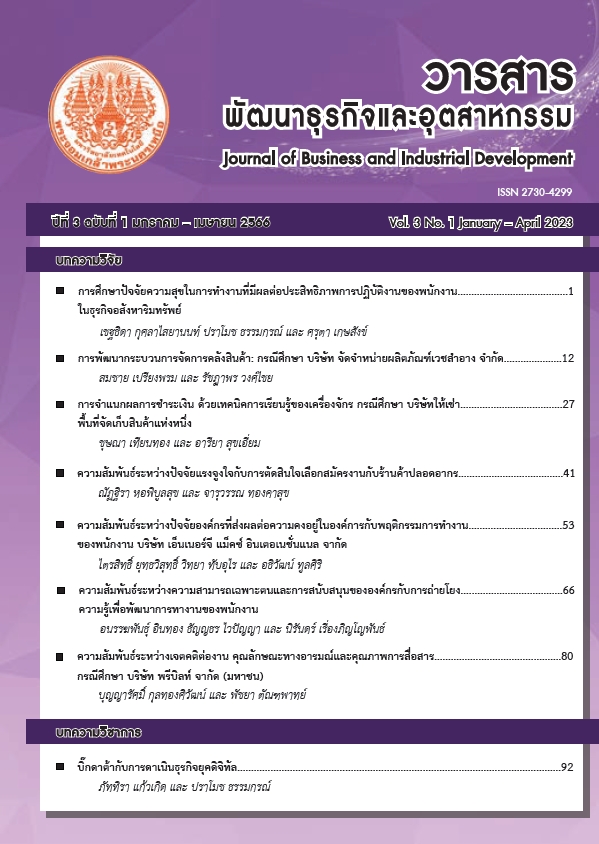The Relationship between Work Attitude, Emotional Characteristics and Quality of Communication. A Case Study: Pre-Built Public Company Limited
Keywords:
Self-Efficacy, Ability to Work, Organizational Support, Knowledge TransferringAbstract
The study on the relationship between work attitudes, emotional characteristics and quality ofcommunication factors: A Case Study of Pre-Built Public Company Limited: aimed to study: 1) the factors of attitude towards work, emotional characteristics and quality of communication, 2) the relationshipbetween attitude towards work, emotional characteristics and quality of communication. A Case Study: Pre-Built Public Company Limited. The study was a quantitative research. The research tool was aquestionnaire. The data were analyzed by statistics of frequency, percentage, mean, standard deviation, t-test, F-test and Pearson Product Moment Correlation Coefficient. The results revealed that therespondents were mostly males, aged between 31– 40 years old, and an education level belowbachelor's degree, with 1– 3 years of experience. The results found that the overall level of attitudetowards work was at a high level, the emotional characteristics and the quality of communication wereat the average levels. The study found that the attitudes towards work, the emotional characteristics and the quality of communication were related at the significant level of 0.05
References
Malithong, K. (2005). Technology and Communication for Education. Bangkok: Arun Printing House. (in Thai).
Pattanapongsa, N. (1999). Strategic Communication Campaign for Changing Human Behavior Focusing on Group Specifics. Chiang Mai : Green fence publishing house. (in Thai).
Kaewpradit, E. (2002). Educational Technology: Educational Principles and Concepts into Practice. Songkhla: Thaksin University. (in Thai).
Thiyao, S. (1995). Communication in The Organization (3rded.). Bangkok: Thammasat University. (in Thai).
Sikkhabundit, S. (1997). Writing for Communication. Bangkok: Duangkamol Publishing House. (in Thai).
Meechat, W. (2005). Public Organization Management Behavior. Bangkok: Chulalongkorn University. (in Thai).
Pholmanee, T., & Likhitwattanaset, R. (2001). The Preparation of The Quality Management System According to The International Standard ISO 9001, Operational Edition. Bangkok: Window to the World Publishing. (in Thai).
Prakobphol, R. (1997). Elements of Communication and The Process of Communication. Teaching Documents for The Main Courses and Communication Theory (13thed.). Nonthaburi: Sukhothai Thammathirat University. (in Thai).
Kaewchampa, O. (2004). Thai Language for Business Communication. Bangkok: Odeon Store.(in Thai).
Poompak, C. (1973). Psychology of Instruction. Bangkok: Thai Wattana Panich. (in Thai).
Suwanachat, T. (n.d.). Social Development, Boundaries and Concepts. 2520. http;//socialscience.igetweb.com/index.php?mo=3&art=59345 (in Thai).
Chiangkul, W. (2009). Psychology of Intelligence and Creativity. Bangkok: Sai Than. (in Thai).
Baron, R. A. (1987). Interviewer’s Moods and Reaction to Job Applicants: The Influence of Affective States on Applied Social Judgments. Journal of Applied Social Psychology, 17, 911–926.
Downloads
Published
How to Cite
Issue
Section
License

This work is licensed under a Creative Commons Attribution-NonCommercial-NoDerivatives 4.0 International License.





